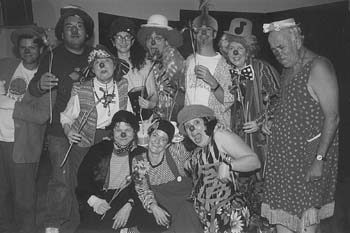![[MetroActive Features]](http://metroactive.com/features/gifs/feat468.gif)
![[MetroActive Features]](http://metroactive.com/features/gifs/feat468.gif)
[ Features Index | SF Metropolitan | MetroActive Central | Archives ]
Clown Alley
 Clowning Around: While some students at the Clown School of San Francisco become professional clowns, others just draw upon the lessons of simplicity and openness in their own lives. Behind the laughter at the Clown School of San Francisco By Millie
A lot of people have stereotypes of clowns," says Christina Lewis, whose professional clown name is Dotty Moppet the Clown. Lewis has been doing clown work for 10 years and is the principal instructor at the Clown School of San Francisco. "Some people think of clowns as ditzy and simplistic. I mean, there is a way that clowns are simplistic, but clowns are also an expression of the human condition, and the human condition is so much richer than just being happy." At the Clown School, students of all skill levels learn the art of clowning. In the beginning class, students focus on building a character using their own unique physical attributes and eccentricities. Theatrical improvisation and exploration lead to a unique vocabulary of gestures that express the character of the clown. A fundamentally sad clown might have slumped shoulders and a shuffling gait, while a nervous clown might have quick twittering hands and an arrogant clown might have a puffed up chest and a bellowing voice. The idea is to root the clown into the individual. While beginning students typically want to run first to the trunk of old clothes and makeup, Lewis discourages this tactic. "We would rather have students work from the inside out," Lewis says. "The costume should speak to the character." The intermediate class focuses on ensemble work--how clowns can interact with one another and the world around them. In the advanced workshop, Lewis helps students to create performance pieces for their characters. We're talking about real theater here, not balloon tricks. Lewis tells the story of a Jesuit priest from Korea who took the class: "This fabulous priest was from a totally different culture where they express their emotions in a totally different way. He created this clown that was the devil. It was his opportunity to express all of his anger. It was fabulous!" Although professional opportunities are indeed an important part of clowning, Lewis perceives clowning as more of a "soul journey." "Before clowning, I was this super intellectual, very worried person," she says. "When I decided to do clown work, it saved my life. ... So much of clowning is about making mistakes and celebrating our mistakes. As a perfectionist, that aspect of clowning has really saved my ass." Students at the Clown School use their skills in all sorts of ways. Some become professional clowns; others move into performance art or theater. Still others never don the whiteface again but just draw upon the lessons of simplicity and openness in their own lives. Lewis, however, encourages all of her students to work with kids. "Working with children is wonderful because you're an archetype to them," she says. "You're a character from their world. There's a lot of responsibility because there are a lot of clowns that are frightening, and they'll scare a kid. Children between 3 and 6 are very keyed into clowns. When they get a little older, they can get a little sarcastic. Some adults don't like clowns. They don't want to have anything to do with you because of past experiences."
The beginning course starts Sept. 30. The fee for 12 classes is $360. Classes are held at Shotwell Studios, 3252A 19th St. To contact the school, call 415/206-1765. [ San Francisco | MetroActive Central | Archives ]
|
Copyright © Metro Publishing Inc. Maintained by Boulevards New Media.
![]()